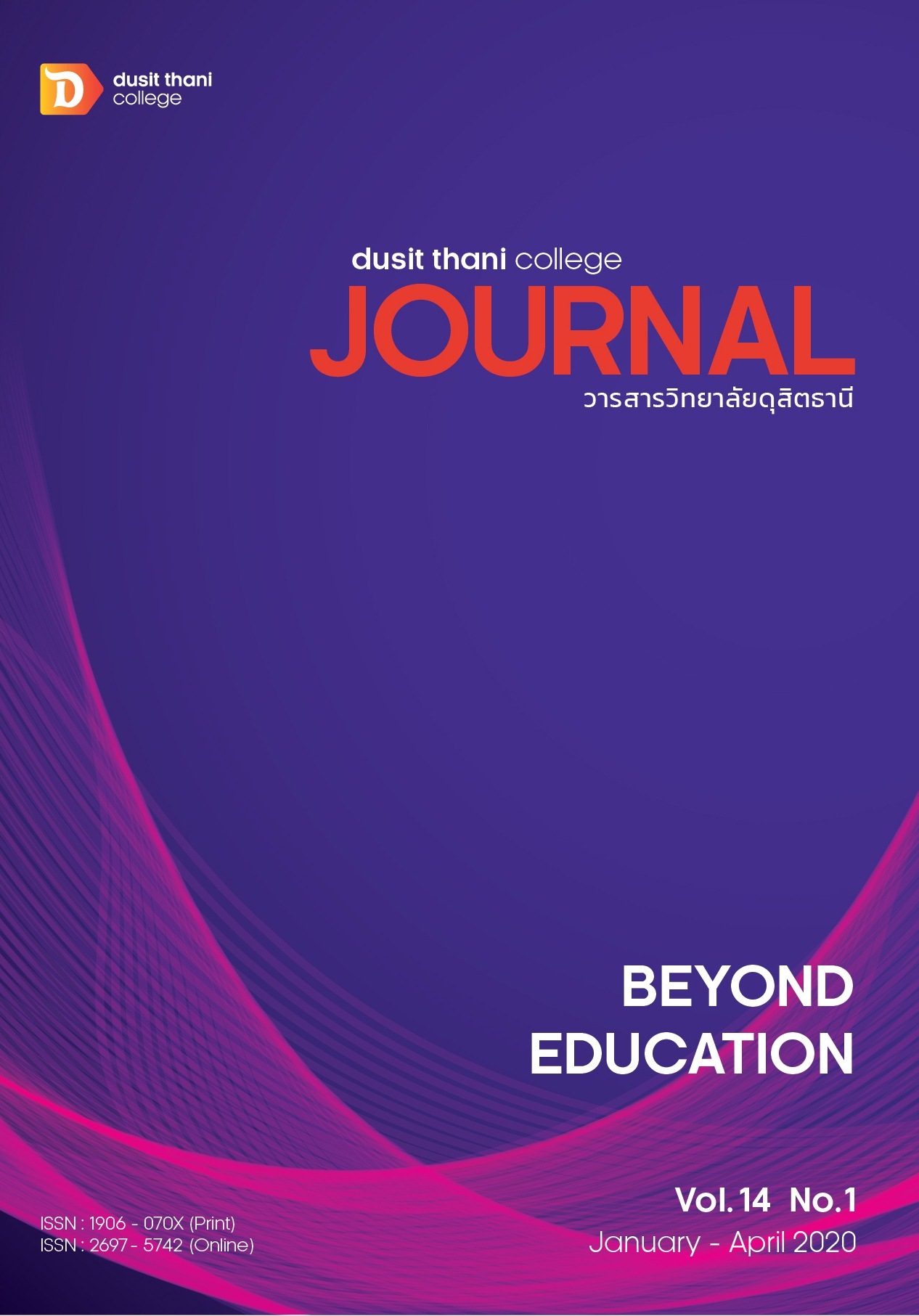Relationships between Attitude and Water Resource Conservation Behavior of Responsible Person for Water Management: A Case Study of 3 Stars - Hotel in Bangkok
Main Article Content
Abstract
The purposes of this research were 1) to examine attitudes of the hotel personnel towards water conservation, 2) to examine behaviors of the hotel personnel towards water conservation, 3) to identify relationships between attitudes and behaviors towards water conservation that affect the differences in hotel sizes. A questionnaire and an in-depth interview were the primary instruments to collect data for this research study. A questionnaire was employed to obtain quantitative data from 135 participants who worked in 3-star hotels in Bangkok; whereas the interviews with the key informants were carried out for qualitative data. In this research, the quantitative data were analyzed with Frequency, Percentage, Mean and Standard Deviation as well as inferential statistics such Pearson product-moment correlation coefficient and One-way Analysis of Variance; while content analysis is applied to the qualitative data.
The research findings had led to three conclusions. Firstly, the participants’ attitudes and behaviors towards water conservation were moderately positive. Secondly, the study had suggested a weak correlation between water conservation attitudes and codes of practice as well as between water conservation behaviors and codes of practice. Most importantly, from comparing the various sizes of hotels in which the participants work, the size of hotel played insignificant role at the 0.05 level in shaping the participant’s attitudes, behaviors and codes of practice towards water conservation. The interview of water management and conservation participant in hotel recommended that government must have a seriously support for the strategy and development mechanism to grow the appropriate attitude for 3-star hotels. Thus, 3-star hotels have limitation in terms of specialist and fund for water conservative training which can perform a high performance water conservation along with the sustainable development.
Article Details
Article Screening Policy
- All research and academic articles to be published must be considered and screened by three peer reviews in the relevant field / article.
- All articles, texts, illustrations and tables published in the journal are the personal opinions of the authors. Editors don't always have to agree. And no responsibility whatsoever is the sole responsibility of the author.
- The articles to be published must never be published. Where did you first publish? And not in the consideration of other journals If the audit found that there has been a duplicate publication It is the sole responsibility of the author.
- Any article that the reader sees as being plagiarized or impersonated without reference. Or mislead the work of the author Please let the journal editor know it will be your greatest blessing.
References
2. Ajzen, I. (1991). The theory of planned behaviour. Organization Behaviour and Human Decision Process, 50, 179 - 211.
3. Barberan, R. Egea, P. Gracia-de-Renteria, P. and Salvador M. (2013). Evaluation of water saving measures in hotels: a Spanish case study. International Journal of Hospitality Management, 34, pp. 181 - 191.
4. Bloom, Benjamin S. and James H. Block. (1975). Mastery Learning Mastery Learning Theory and Practices. New York.: Holt, Rinchart and Winston.
5. Choog, D. (2017). “MasterCard global destination cities index”. MasterCard Worldwide Insights.
6. Eric S.W. Chan et al. (2014). What drives employees’ intentions to implement green practices in hotels? The role of knowledge, awareness, concern and ecological behaviour. Inter Journal of Hospitality Management, Volume 40, July 2014, 20 - 28.
7. Heung, V.C.S. Pun, P.S.K. (2013). Dimensions of environmentalism: a study of policies and good practices in the Hong Kong hotel industry. Journal of China Tourism Research. 9 (1), 50 - 80.
8. Kaiser, Florian G. (2007). Behavior-based environmental attitude: Development of an instrument for adolescent. Journal of Environment Psychology 27, 242 - 251.
9. Khamkeaw, T. (2014). Tourists attitude, food safety perception and awareness, and satisfaction Thai food at Chiang Mai destination. Maejo University, Chiang Mai
10. Kirk, D. (1998). Attitudes to environmental management held by a group of hotel managers in Edinburgh. International Journal of Hospitality Management, 17, 33 - 47.
11. Krejcie, Robert V. And Morgan, Daryle W. (1970). Determining Sample Size for Research Activities. Education and Psychological Measurement. Vol 3, 607 - 610.
12. IHEI (1993). Environmental Management for Hotels, Oxford: Butterworth-Heinemann.
13. Lita, Ratni P., et al. (2014). Green Attitude and Behavior of Local Tourists towards Hotels and Restaurants in West Sumatra. Indonesia. Procedia Environmental Sciences, 20.
14. Pramnok, N. (2001). Media exposure, knowledge, awareness of hotels’ executives and participation in environmental conservation of hotels in Bangkok. Chulalongkorn University, Bangkok.
15. Pliangam, S. (2017). Water usage and demand estimation of water use for hotels in Bangkok. Master Degree of Architecture, Department of Architecture, Chulalongkorn University, Bangkok.
16. National Statistics Office Thailand. (2014). Hotel and Guest House Survey Report. Retrieved from http://service.nso.go.th/nso/nsopublish/themes/files/questPdf57.pdf
17. Ngamrussamiwong, S. (2007). A Study of the Third Level Students’ Attitude and Environmental Conservation Behaviors at St. Gabriel’s Foundation Thailand Schools, Bangkok. Thesis of Master of Education degree, Srinakarinwirot University, Bangkok.
18. Saenyanupap, S. (2011). Hotel Manager Attitude toward Environmental Sustainability Practices: Empirical from Hotels in Phuket, Thailand. Thesis of Master Science in Hospitality and Tourism Management in Rosen College of Hospitality Management, University of Central Florida.
19. Songsoonthornwong, C. (2007). Participative Behaviors in Natural Resources and Environ -mental Conservation of Hotel Personnel: A case study in the 4 and 5- Star Hotel in Bangkok. Bangkok: Dusit Thani College.
20. Wei Min. (2011). An Analysis on Environmental Awareness and Behavior in Chinese Hospitality Industry - A case of Xiamen City. Energy Procedia. Vol 5. 1126 - 1137.


